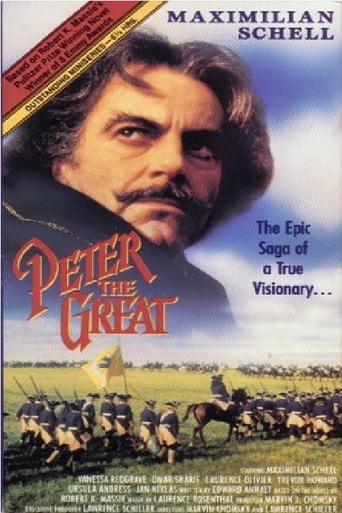

The film creates a perfect balance between action and depth of basic needs, in the midst of an infertile atmosphere.
... View MoreThis movie feels like it was made purely to piss off people who want good shows
... View MoreThe movie is wonderful and true, an act of love in all its contradictions and complexity
... View MoreThis is one of the best movies I’ve seen in a very long time. You have to go and see this on the big screen.
... View MoreThis is a hard-to-find NBC TV mini-series from the eighties. The film is a very well-made historical (true) period drama, in six hours, a super-production relating the life and times of czar Peter the Great of Russia, with a stellar ensemble cast including Laurence Olivier, Vanessa Redgrave, Omar Sharif, Mel Ferrer, Ursula Andress, and Elke Sommer, some of them in cameo roles, but they look great in period costumes. Peter the Great is powerfully portrayed by Jan Niklas (younger czar) and Maximillian Schell (adult czar) with Maximillian Schell giving the character epic proportions in the latter years. The series is unpretentiously directed by Marvin Chomsky, with attention to detail to the prevailing conditions and settings of the times: For instance one does not feel artificial light was used at any time, as all filming seems to have been done outdoors in natural light or indoors with chandeliers and candle lights. The Director of photography is Vittorio Storaro who is the cinematographer of such visual feasts as "The Last Emperor", "Apocalypse Now", and "The Sheltering Sky". This mini-series was filmed on location in the ex-USSR (Russia) when it was under Communism, with artistic and technical assistance of an extended Russian crew, which was, at the time, a remarkable example of cultural cooperation between East and West. I hope this film will be digitally remastered, it deserves it, and it would be advisable to affix a (12) rating on the DVD due to scenes of some violence and mild intimate encounters, and of course include side features perhaps by contributors to the original series at the time. This must be one of the best ever made-for-TV historical films, and a great entertainment with palace intrigues, power politics, passionate relationships, and men and women who changed the course of history.
... View MoreNobody mentioned in their reviews that the wonderful Lilli Palmer played Natalia, the mother of Peter the Great, which gave her a golden globe nomination for best support, though she died before the TV miniseries aired on TV... Yes this was her last performance after a Forty year career in films TV and theater around the world.. She is terrific and her last scene, her death scene, is particularly poignant.. There has been criticism that the miniseries is not historically correct. OK but its a miniseries, not a serious documentary and so poetic justice is expected and acceptable. They did get the idea of who Peter was and what he did for Russia and that is what is most important. A wonderful cast in this lavish production and a marvelous chance to see the still beautiful Miss Palmer in her last role, even though she was already apparently dying of cancer and quite ill during the shoot. IT is a shame she did not live to see her nomination, which she lost.
... View MoreI liked this series very much although it started to drag during part 4. I was vaguely familiar with Russian history and thought the series was accurate; that is until I read some of the comments from those truly knowledgeable of Russian history.But my main contribution to this forum is to recount what my wife (a Russian) said about the movie as we watched it. First of all, how would we Americans like it if a movie about Abraham Lincoln portrayed him as a man of average height? Peter the Great was about 6'8" or 6'9". She also wishes that they would have shown how Russians built boats in the North and had to carry them a long way over land (I think she meant when they attacked the Turks at Azov). The movie also neglected to show how Peter established Universities and sent students to study in Europe.And as one other person commented, I wish they would have shown more of St. Petersburg and how it was built.It seems that there is enough material here for a ten part series rather than four.
... View MoreThe movie is fantastic -great plot, superb acting and characterization, fantastic sets, costumes and music. BUT It is historically very inaccurate - Peter suffered from bouts of temporary insanity. Far from betraying him his first wife was madly in love with him and bombarded him with love letters througout his European tours. Also ironically (remember Omar Sharif's comment on Peter being strong and Ivan weak) most of Peter's twenty something children died in infancy - Ivan produced a flock of children and grandchildren.
... View More